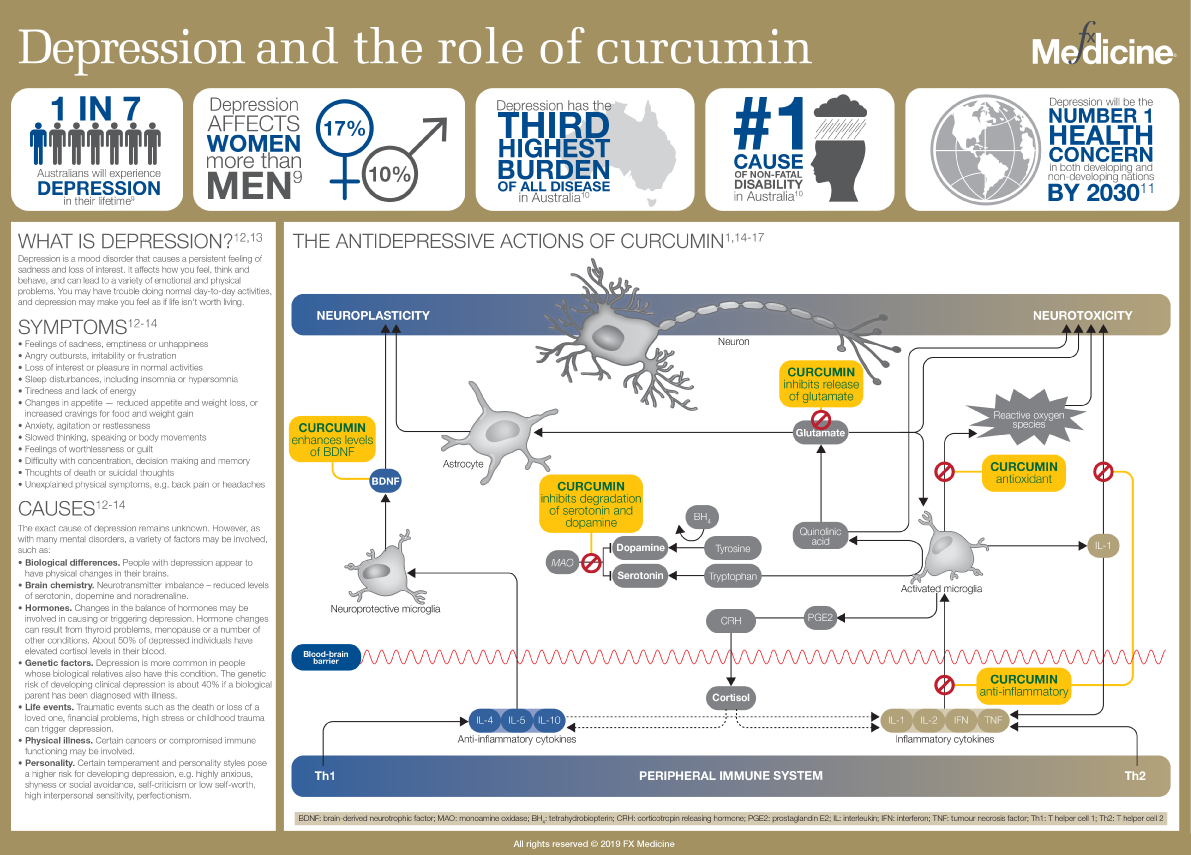
A growing body of research has demonstrated the effectiveness of curcumin in the treatment of depression by acting on numerous underlying targets.
Curcumin is a modulator of various neurotransmitters, in part, by inhibiting monoamine oxidase (MAO-A and MAO-B), which is involved in catalysing the oxidation of dopamine, noradrenaline and serotonin.[1]
By increasing the levels of brain-derived neurotrophic factor (BDNF), curcumin has also demonstrated a role in promoting neuronal survival and hippocampal neurogenesis.[2]
Furthermore, it has been proposed that the anti-inflammatory properties of curcumin contribute to its antidepressant activity. Inflammation is known to play a major role in the pathophysiology of major depressive syndrome. Curcumin is a potent anti-inflammatory compound shown to inhibit cytokine-producing helper T cells (Th1 or Th2), cyclooxygenase (COX)-2, nuclear factor kappa B (NFkB) transcription[3] and nitric oxide synthase.[4]
Curcumin exhibits pharmacological safety and efficacy and has shown potential for the treatment of a wide variety of diseases. In spite of this curcumin has been limited as a treatment due to its poor bioavailability. The major reasons for the low bioavailability of curcumin are its poor water solubility and absorption, rapid metabolism, and rapid systemic elimination.
REFERENCES
- Depression. Beyond Blue 2014. Viewed December 2014, http://www.beyondblue.org.au/the-facts/depression
- Causes of depression. Black Dog Institute 2012. Viewed December 2014, http://www.blackdoginstitute.org.au/docs/Causesofdepression.pdf
- McNally L, Bhagwagar Z, Hannestad J. Inflammation, glutamate, and glia in depression: a literature review. CNS Spectr 2008;13(6):501-510. [PDF]
- Lin TY, Lu CW, Wang CC, et al. Curcumin inhibits glutamate release in nerve terminals from rat prefrontal cortex: possible relevance to its antidepressant mechanism. Prog Neuropsychopharmacol Biol Psychiatry 2011;35(7):1785-1793. [Abstract]
- Raison C, Capuron L, Miller A. Cytokines sing the blues: inflammation and the pathogenesis of depression. TRENDS 2006;27(1):24-31. [Full text]
This image by FX Medicine is licensed under a Creative Commons Attribution-NonCommercial-NoDerivatives 4.0 International License.
More information about how to share/use the infographics for personal use.
If you interested in using any FX Medicine content for commercial use please contact us.
DISCLAIMER:
The information provided on FX Medicine is for educational and informational purposes only. The information provided on this site is not, nor is it intended to be, a substitute for professional advice or care. Please seek the advice of a qualified health care professional in the event something you have read here raises questions or concerns regarding your health.




